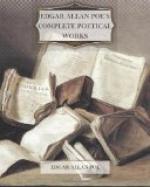We shall reach, however, more immediately a distinct conception of what true Poetry is, by mere reference to a few of the simple elements which induce in the Poet himself the true poetical effect. He recognizes the ambrosia which nourishes his soul in the bright orbs that shine in Heaven, in the volutes of the flower, in the clustering of low shrubberies, in the waving of the grain-fields, in the slanting of tall eastern trees, in the blue distance of mountains, in the grouping of clouds, in the twinkling of half-hidden brooks, in the gleaming of silver rivers, in the repose of sequestered lakes, in the star-mirroring depths of lonely wells. He perceives it in the songs of birds, in the harp of AEolus, in the sighing of the night-wind, in the repining voice of the forest, in the surf that complains to the shore, in the fresh breath of the woods, in the scent of the violet, in the voluptuous perfume of the hyacinth, in the suggestive odor that comes to him at eventide from far-distant undiscovered islands, over dim oceans, illimitable and unexplored. He owns it in all noble thoughts, in all unworldly motives, in all holy impulses, in all chivalrous, generous, and self-sacrificing deeds. He feels it in the beauty of woman, in the grace of her step, in the lustre of her eye, in the melody of her voice, in her soft laughter, in her sigh, in the harmony of the rustling of her robes. He deeply feels it in her winning endearments, in her burning enthusiasms, in her gentle charities, in her meek and devotional endurance, but above all, ah, far above all, he kneels to it, he worships it in the faith, in the purity, in the strength, in the altogether divine majesty of her love.
Let me conclude by the recitation of yet another brief poem, one very different in character from any that I have before quoted. It is by Motherwell, and is called “The Song of the Cavalier.” With our modern and altogether rational ideas of the absurdity and impiety of warfare, we are not precisely in that frame of mind best adapted to sympathize with the sentiments, and thus to appreciate the real excellence of the poem. To do this fully we must identify ourselves in fancy with the soul of the old cavalier:
A steed! a steed! of matchless speede!
A sword of metal keene!
Al else to noble heartes is drosse—
Al else on earth is meane.
The neighynge of the war-horse prowde.
The rowleing of the drum,
The clangor of the trumpet lowde—
Be soundes from heaven that
come.
And oh! the thundering presse of knightes,
When as their war-cryes welle,
May tole from heaven an angel bright,
And rowse a fiend from hell,
Then mounte! then mounte, brave gallants
all,
And don your helmes amaine,
Deathe’s couriers, Fame and Honor,
call
Us to the field againe.
No shrewish teares shall fill your eye
When the sword-hilt’s
in our hand,—
Heart-whole we’ll part, and no whit
sighe
For the fayrest of the land;
Let piping swaine, and craven wight,
Thus weepe and puling crye,
Our business is like men to fight,
And hero-like to die!




